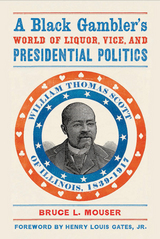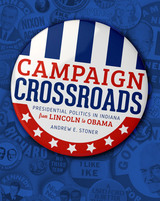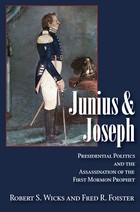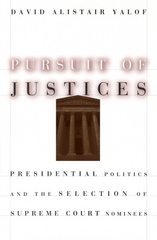4 books about Presidential Politics

A Black Gambler’s World of Liquor, Vice, and Presidential Politics
William Thomas Scott of Illinois, 1839–1917
Bruce L. Mouser
University of Wisconsin Press, 2014
William Thomas Scott (1839–1917) was an entrepreneur and political activist from East Saint Louis and Cairo, Illinois, who in 1904 briefly became the first African American nominated by a national party for president of the United States before his scandalous past forced him to step aside. A free man before the Civil War, Scott was a charismatic hustler who built his fortune through both vice trades and legal businesses including hotels, saloons, and real estate. Publisher and editor of the Cairo Gazette and an outspoken advocate for equal rights, he believed in political patronage and frequently rebelled against political bosses who failed to deliver, whether they were white, black, Republican, or Democrat.
Scott helped build the National Negro Liberty Party to forward economic, political, and legal rights for his race. But the hustling that had brought him business success proved his undoing as a national political figure. He was the NNLP's initial presidential nominee, only to be replaced by a better-educated and more socially acceptable candidate, George Edwin Taylor.
Scott helped build the National Negro Liberty Party to forward economic, political, and legal rights for his race. But the hustling that had brought him business success proved his undoing as a national political figure. He was the NNLP's initial presidential nominee, only to be replaced by a better-educated and more socially acceptable candidate, George Edwin Taylor.
[more]

Campaign Crossroads
Presidential Politics in Indiana from Lincoln to Obama
Andrew E. Stoner
Indiana Historical Society Press, 2017
Campaign Crossroads looks back over the varied, sometimes important, sometimes irrelevant, but always interesting presidential campaign cycles in Indiana’s history. By taking in the influences of technology, transportation and communication itself, we see an evolution in the political process that is not only altogether Hoosier, but also altogether American in its quality and importance.
Using a narrative approach with a mix of primary and secondary sources, the work examines not only the rhetoric of presidents and presidential hopefuls, but also the nature of campaigns and their impact on Indiana communities. While Indiana enjoyed the position of being a battleground state for the better part of a century from the 1870s until the 1960s, it has also been ignored, dismissed, and has on occasion created unexpected political drama.
[more]

Junius And Joseph
Presidential Politics and the Assassination of the First Mormon Prophet
Robert S. Wicks & Fred R. Foister
Utah State University Press, 2005
"Junius and Joseph examines Joseph Smith's nearly forgotten [1844] presidential bid, the events leading up to his assassination on June 27, 1844, and the tangled aftermath of the tragic incident. It... establishes that Joseph Smith's murder, rather than being the deadly outcome of a spontaneous mob uprising, was in fact a carefully planned military-style execution. It is now possible to identify many of the key individuals engaged in planning his assassination as well as those who took part in the assault on Carthage jail. And furthermore, this study presents incontrovertible evidence that the effort to remove the Mormon leader from power and influence extended well beyond Hancock County [Illinois] (and included prominent Whig politicians as well as the Democratic governor of the state), thereby transforming his death from an impulsive act by local vigilantes into a political assassination sanctioned by some of the most powerful men in Illinois. The circumstances surrounding Joseph Smith's death also serve to highlight the often unrecognized truth that a full understanding of early Mormon history can be gained only when considered in the context of events taking place in American society as a whole."
[more]

Pursuit of Justices
Presidential Politics and the Selection of Supreme Court Nominees
David Alistair Yalof
University of Chicago Press, 1999
Although the Senate confirmation of Supreme Court nominees is the most public part of the nomination process, the most critical phase—the initial selection of nominees—is usually hidden from view. In Pursuit of Justices, David Yalof takes the reader behind the scenes of what happens before the Senate hearings to show how presidents go about deciding who will sit on the highest court in the land. As Yalof shows, an intricate web of forces—competing factions within the executive branch, organized interests, and the president's close associates—all vie for influence during this phase of presidential decisionmaking.
Yalof draws on the papers of seven modern presidents, from Truman to Reagan, and firsthand interviews with key figures, such as Ramsey Clark, Edwin Meese, and President Gerald Ford. He documents and analyzes the selection criteria these presidents used, the pool of candidates from which they chose, their strategies, and the political pressures affecting their decisions, both successes and failures. Yalof also disputes much conventional wisdom about the selection process, including the widely held view that presidents choose nominees primarily to influence future decisions of the high court. In a substantial epilogue, Yalof offers insightful observations about the selections of Presidents George Bush and Bill Clinton.
By focusing on a neglected area of presidential politics, Yalof offers a fascinating and unprecedented glimpse into the intricate world of executive branch decisionmaking and the Supreme Court appointment process as a whole.
Winner of the 2000 Richard E. Neustadt Award for Best Book on the American Presidency
Yalof draws on the papers of seven modern presidents, from Truman to Reagan, and firsthand interviews with key figures, such as Ramsey Clark, Edwin Meese, and President Gerald Ford. He documents and analyzes the selection criteria these presidents used, the pool of candidates from which they chose, their strategies, and the political pressures affecting their decisions, both successes and failures. Yalof also disputes much conventional wisdom about the selection process, including the widely held view that presidents choose nominees primarily to influence future decisions of the high court. In a substantial epilogue, Yalof offers insightful observations about the selections of Presidents George Bush and Bill Clinton.
By focusing on a neglected area of presidential politics, Yalof offers a fascinating and unprecedented glimpse into the intricate world of executive branch decisionmaking and the Supreme Court appointment process as a whole.
Winner of the 2000 Richard E. Neustadt Award for Best Book on the American Presidency
[more]
READERS
Browse our collection.
PUBLISHERS
See BiblioVault's publisher services.
STUDENT SERVICES
Files for college accessibility offices.
UChicago Accessibility Resources
home | accessibility | search | about | contact us
BiblioVault ® 2001 - 2024
The University of Chicago Press









